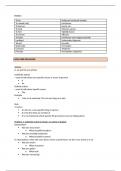Summary
Summary - Engels
- Course
- Institution
A complete summary of the course in communication - English, taught in the first semester of the first year of Real Estate. Present in all lessons, summary based on the lessons, the PPT's and the course. This summary made it easy for me to get through the first seat. Definitely recommended!
[Show more]



